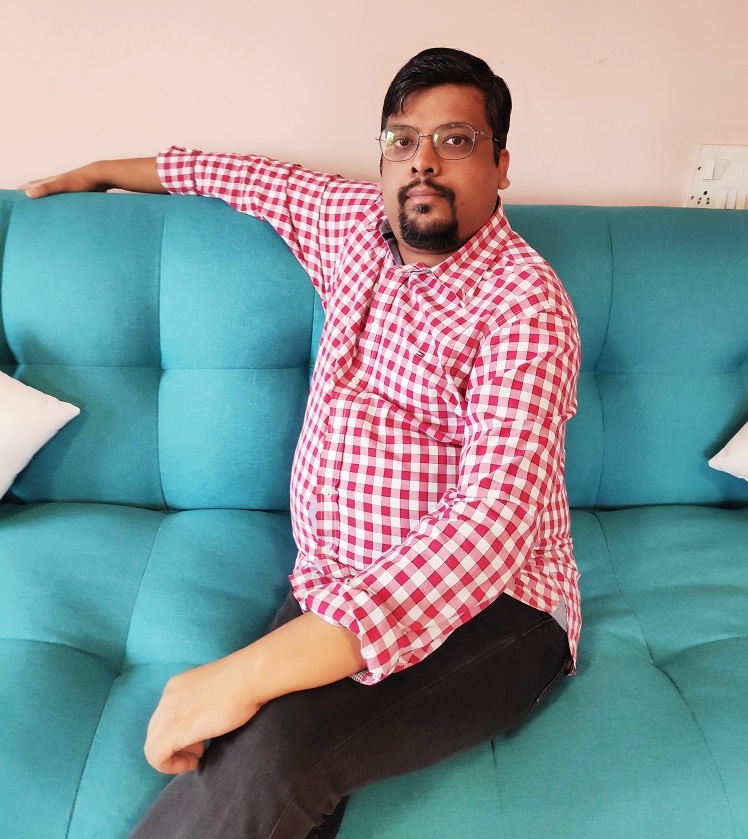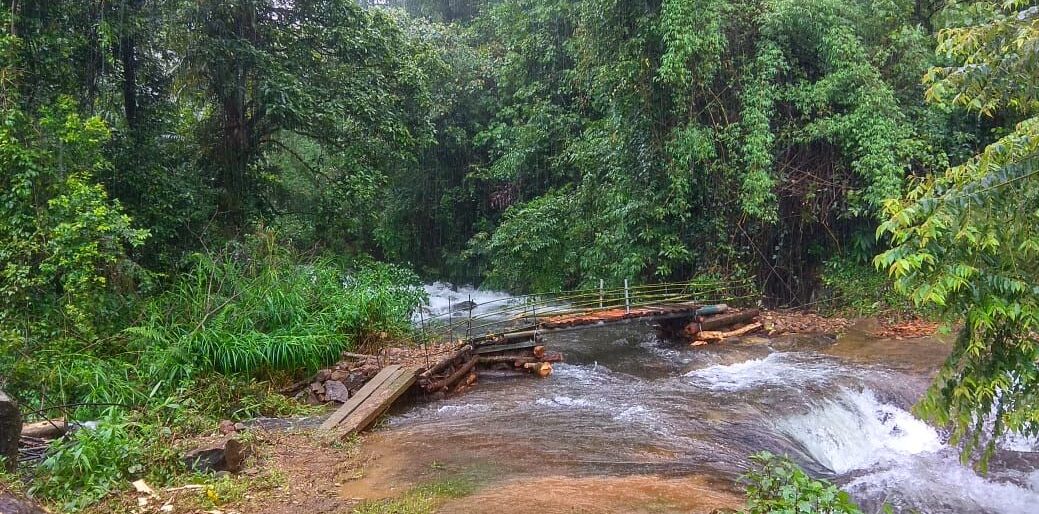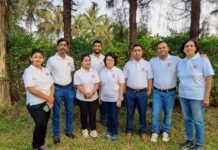
Beforest is a farming collective company based on the idea of ‘collective farmlands’. It brings like-minded people together into unison to redefine farming. It provides a common platform for all. The main aim of the platform is to collectively buy a large estate, to formulate a plan for it and to execute and manage the estate thereon. Each member in the community also gets an ‘earth home’ where they could stay and participate in the activities on the estate. The first community had been working on the project for over a year before the company was formally incorporated as Beforest Lifestyle Solutions Pvt Ltd on 20th June 2018.
About the founders:
Beforest is lucky to have three forethinkers as its co-founders. P. Sunith Reddy – Co-founder and CEO, Shaurya Chandra – Chief Financial Officer and Sameer Shisodia – Chief Farming Officer.

Sunith is a Computer Science Graduate from IIT Madras, he is also a techie and a former Yahoo employee. After a brief stint with Lime Labs LLC, he started one of India’s first and most successful algorithmic trading firms – iRageCapital Advisory Pvt Ltd. Sunith also co-founded multiple startups including RentSetGo in the shared economy space prior to 2017.

Sameer is a Computer Science graduate from BITS, Mesra. Prior to founding Beforest, Sameer worked for elite corporations like Oracle and Yahoo. Then he ventured into interesting startups like Ziva, a mobile search engine and Linger, an aggregator of boutique holiday properties across the country. Most recently, Sameer brought together like-minded folks to create a large collective farm near Bangalore. This eventually culminated in the creation of Beforest.

Shaurya, the third co-founder of Beforest had worked with Sunith when they co-founded irageCapital as well as an ed-tech company in the algorithmic trading space – Quantinsti Quantitative Learning. Shaurya is an IIM Ahmedabad and IIT Roorkee graduate and incidentally is a guest lecturer at IIM-A. He delivers lectures on quantitative trading using algorithms. Prior to that, he was one of the star traders at Edelweiss and Bank of America before becoming an entrepreneur with iRageCapital and Quantinsti. Shaurya was also involved in founding Antz Chocolates, a bespoke chocolate line catering to corporates.
The three of them had been discussing and brainstorming about several ideas in the sustainable living space and how there was a strong need to mend our ways to lead a sustainable lifestyle. According to them, we need to get more responsible about food and the environment that we live in. After numerous hours of deliberations and experimentations, they came up with the idea of co-founding Beforest.
Within the company, Sunith is the Co-founder & CEO, spearheads the strategic decisions, controls the day-to-day decision-making, and acts as a liaison to members and media. Shaurya is the Chief Financial Officer, manages the finance front of the company, including getting the right structures in place and managing the cash flow. This is extremely critical for an organisation as they are executing multiple collectives in parallel. Sameer is the Chief Farming Officer. He is the decision-maker for farm practices and the org structure within the collective. He is responsible for the execution of these practices on the farm in all their collectives including the go-to-market for the produce, hiring at the farm level, etc.
Below are excerpts of our conversation with Mr Sunith Reddy, Co-founder & CEO, Beforest:
Q.: What is the problem you are trying to solve?
Ans: In the past few decades, both farming practices, as well as the value of doing it have degraded. In recent years, a lot of folks in urban India have started getting curious and have become interested in farming and food-related practices. Moreover, many have bought pieces of farmland, and have tried to work on it over weekends. Some folks have succeeded, while for most, life and work started to eat up their free time, and the farm suffered after the initial stage of enthusiasm faded. It’s also a little expensive to have a caretaker stay on and manage a 2-3 acre farm – the manpower, the basic inputs and infrastructure easily need a few lakhs a year at the very least. In such a scenario, farming becomes unviable and once the initial excitement wears off, the farm goes into limbo.
We saw this problem occur repeatedly and decided to solve it. Farming Collectives is our solution to this problem.
Q.: Can
you share with us any insights that led you to believe that this is a big
problem?
Ans: Today, when you look at the suburban countryside of any
big city, we see vast tracts of land that remain unused but are classified as
agriculture lands. At the same time, we talk of an impending food crisis. We
feel the crisis is primarily because farming as we know it today is not viable.
This is when we started looking for more integrated approaches that mimic
nature, reduce dependencies on inputs from our side and create resilient
ecosystems. Add to this the impending water crisis as well. 20 cities in India
are set to run out of groundwater by 2020. Chennai and Shimla already have. Had
it not been for a cyclone in july, Bangalore and Hyderabad had just enough to
survive till the end of September 2019. These are not temporary or occasional
problems. The need to manage our landscapes and resources sustainably is
evident and the consequences of not doing that are staring at us in the face.
Collectives make a lot of sense in this scenario as they allow us to reach
scales that are not possible individually. In many ways, this is the silver
bullet.
Q.: Tell
us about the Product / Solution. Explain how you went about the Product-Market
Fit Process.
Ans: As a concept, it is very simple. Our platform enables an
individual who is interested in a sustainable life or sustainable agriculture,
looking to start his/her own farm to come together and participate in a collective
farm. So instead of 50 people owning a 2-acre farm each, we are trying to
enable a 100-acre farm owned by 50 people. This allows us to do things that are
not possible in a 2-acre space. For example, you cannot have a lake on a 2-acre
farm. Add to this the huge operational efficiency that comes in, in terms of
manpower, infrastructure, water management, land use etc.
Farming is 24 x 7 x 365 days a year job. Most of our members are working in the cities and cannot manage a farm on a day to day basis. Inconsistent attention is a big reason why farms fail. Beforest acts as that layer of service that keeps the farm running, keeps the needle moving on a day to day basis. We bring expertise from different fields of sustainability to help us out. We have the execution experience and most importantly, set the right expectations in the minds of the farm owners to avoid unnecessary stress on the land.
Once we have set up the farm, we manage and run it on behalf of the collective. This means we also moderate their discussions and enable decision making and its execution. Most importantly, we manage the go-to-market for the produce and the by-products under our brand BEWILD.
The idea of a collective farm was not created in a room going through a huge pile of data etc. It arose organically with us as the first users along with acquaintances who were facing similar battles on their farms. Around the breaking point when we were about to give up on it, we tried this out together and this eventually culminated in our first collective – Tamarind Valley Collective. Once we saw the transformation of the landscape using this approach not only at the farm level but at an ecosystem level, we knew this was an idea that was meant to scale up.
Q.: What is your USP?
Ans: The key to sustainable agriculture is to get the fundamentals of the ecosystem right and not to worry about the farm yield until this recovery process is complete. The recovery is measurable. For example, throughout the Deccan plateau, the soil carbon content has dropped to 0.3% on an average. A healthy forest system in the same area would have somewhere between 3-8%. This 10x gap between where we are and where we should need to be bridged first, before worrying about the yield and stressing out the land. Until this gets better no matter what you do, the ecosystem is not sustainable. This is just one of the many parameters we monitor to understand our environment. We view our farms currently as kindergarten kids. We are interested in just getting the fundamentals right – their gross motor skills, cognitive intelligence etc. We are not really concerned about what salary they will draw. This is the key differentiator in our approach.
We are drawing heavily on permaculture principles, which basically means growing food in the context of forests. These food forests have been shown to be super productive on a small scale but a handful has been able to execute a 100-acre landscape using these methods as they are very observation dependent. We have demonstrated through tamarind valley collective that we are one of this handful. The food that grows here is wild in nature, which is a few steps beyond being organic. We believe in the days to come this will be our USP – the ability to grow wild and natural food.
Q.: What
were your assumptions when you entered the market, learning that you
have?
Ans: As I have mentioned earlier, the company emerged
organically. We did have a few assumptions. The most important amongst them was
that we will be able to scale up a food forest over an entire landscape and the
productivity at maturity would stay the same as small scale food forests. We
are quite confident it will.
Today there is a huge circle of concern that encompasses most urban Indians who are concerned about the food we eat and the water we drink. From amongst this, there is a smaller circle of action, the people who are troubled enough to attempt a solution for themselves. These are folks who try growing their own food, try to switch to a more sustainable life etc. Our ideal customers are those who are in this circle of action.
Between the four collectives that are in progress, we have had at least 1000 conversations with people who are interested in being a part of our collectives. However, we have been very careful in selecting with who comes on board to safeguard the intent behind each collective. As of today, we have 100+ members who have signed up for the collectives across Hyderabad, Bangalore and Coorg. These members come from all parts of the country.
Q.: How are you pricing the Product? Explain your thought process.
Ans: A membership in a Beforest collective gives you a certain portion of the land, all the associated earthworks and an earth home. We were clear from the start that this is not an investment asset class for people to invest in. It was more of a choice that emerges once our customer has decided to own a farm of his own. In that sense, it is a consumer product and not an investment product. So we wanted to make that purchase decision very easy by bringing down the costs. Keeping it largely crowdfunded is one way to do so. We have also reduced the margin on the cost price to a wafer-thin level. This keeps us on the right track of wanting to make the collective work and not just wanting to sell it. Our initial comparison in the minds of the customer is between a home and a farm. So, we wanted to keep this below the price of a one-bedroom apartment in the city. Which is why membership is typically priced around the 40 Lakhs mark.
Q.: How did you get your first customer?
Ans: Most of our early customers were people who we knew personally or friends of friends. Essentially, they came from within a circle of trust. Our collectives are largely crowdfunded – this means that the early members pay for the land before the land is bought, pay for the design before the design is in place and so on. Hence trust plays a big role. Naturally, our early adopters were those who were very well entrenched in our lives, friends, family and known business associates.
Q.: Please tell us about the investors (if any)
Ans: We have raised a seed round for funding to bridge the gap between the money raised from our early members and the actual cost of land acquisition for the entire collective. We do not wish to disclose the details of this round. However, we can say that we have engaged with seasoned investors who have expressed an interest in the long-term vision of Beforest and whose investment thesis is centred on ethical and sustainable businesses.
Q.: Is there any interesting success story? If yes, please write about it?
Ans: Beforest is just over a year old. In that sense, we have a long road ahead of us. In the short journey, that we have covered so far, the level of trust we have been able to inspire in people has been phenomenal. We believe a lot has to do with the way we communicate our intent in every aspect of our business. Our first collective in Bangalore, Tamarind Valley Collective emerged organically. The second one in Bangalore and the one in Coorg (also close to Bangalore) had the advantage of using Tamarind Valley as a proof of concept to help prospective members understand our idea. The real challenge was to seed this idea in Hyderabad. When we started in Hyderabad, we only had a broad idea about the area we are looking at and a conceptual understanding of what we are planning to do. Since the land was not acquired, we did not have any specific plans. We had to completely rely on our personal trust to get a few early adopters to seed the community there. We were blatantly transparent about the process and the fact that we did not have all the answers, there was a risk associated with it and that we are truly in favor of mitigating it. This worked in our favor and is ingrained in the DNA of Beforest today. We had 27 early adopters (that’s 40%) of the collective before we had even acquired the land.
Q.: What is the big picture of your startup? Is this Product/service leading to something bigger? If so, how?
Ans: Our Vision with BeForest, is to create landscapes that are completely self-contained – including food, water and energy. We want to build a community that is centred around a local economy and is a net producer. The idea is not to compromise on a modern lifestyle while being truly sustainable. Our collectives are only intended to be a proof of concepts and incubation centres for the local economy. We expect that once we show how sustainable farming can be viable, surrounding farmers can be convinced to integrate into the Beforest collectives and our practices, thus creating a thriving co-operative that encourages local and seasonal food products. We feel that this is one of the few ways to scale without deploying a king’s ransom as CapEx.
Q.: Since inception, give us a sense of the value of business done by your venture? Please explain in details:
Ans: In the last one year, our combined subscriptions would be more than 20 crore INR. Roughly that would be our turnover. However, this does not hold much significance for us. What’s more important is that 100+ members have placed their faith in our idea of sustainable agriculture. It is also important to remember that these 100 have emerged from in-depth conversations with at least a thousand fosonallks who expressed interest in the idea.
Q.: What is the insight that you have about this market, which no one else has? The uniqueness about your Startup.
Ans: Today, word of mouth from a trusted circle is a lot more powerful than any certification one might have. We understand this very well. No amount of tags can compare to a family member vouching that they know where this food is grown and the people who grow it. This is the circle of trust we are creating via our collectives. Each of our collectives is a circle of 50 trusted members, each of them knows another 50 people. This is the network we are banking on to penetrate in a very competitive market. It is a small network but what we have experienced is that it is much more powerful than a mass consumer product with dozens of certifications.
Q.: List
all the names of the core Team Members, along with their Designated Roles.
Ans: Each of our collectives has autonomous teams of 10-15
members living on-site, starting from the farmhand to the estate manager, who
is in charge of all activities within the estate. The Beforest central team
currently has 6 members (including the founders). The roles of the founders
have already been delved into before. In addition, we have:
- Praveen Ram, GM – Farm ops, who monitors and sets targets for the farm level operations at each of the collectives.
- Rajashekhar Reddy, GM – Finance, responsible for financial auditing of the collectives and the operational role of disbursing payments etc.
- Alok Parasurampuria, GM – Operations, responsible for non-farming related operations on-site, like construction, supply logistics, site operations etc.
In addition to this, we have a host of consultants we engage with on specialized verticals like design, permaculture, wildlife management etc.
Q.: Who
do You Perceive as Your Competition? How do you differentiate yourself with
them?
Ans: There are a few real estate companies now looking to take
their offerings to market with a farm, non-urban living and better food story,
but we don’t really see a complete end to end interest in the operations, in
the commitment to staying the course in rejuvenating the landscape the right
way – not something that can be pulled off in a short term – and in the belief
in the core ideas around sustainable farming over, say, creating a
differentiated “layout”. We, in fact, would love to see more activity in this
space so this idea grows faster and wider.
Q.: What
would be your goal to accomplish in the next six months?
Ans: Apart from making steady progress on the collectives, our
big task for the next 6 months is to create a go-to-market strategy and execute
it for the produce, that has now become increasingly steady in terms of
quantity. Tamarind Valley has been giving us wild produce in spurts for a year
now but with more of the collective being covered by the food forest, we expect
the produce quantity to reach levels that would create a surplus beyond the
community. Similarly, Alphonso by the lake has an annual harvest of wild
mangoes and Poomaale Collective would have its winter harvest of coffee beans
and other wild fruits. We are working on different models and experimenting
actively to see which paradigm of go to market fits our use cases the best.
Q.: What
message do you want to convey to fellow entrepreneurs?
Ans: What we find beautiful about Permaculture is the
practicality of this approach and how it extends to beyond just growing food.
The core of the philosophy is centred around observe, experiment, adapt,
repeat. This is the mantra that holds true for every entrepreneur as well.
Quite often, we are misled by our belief that we confuse the optimistic
scenario with the practical scenario. This is a classic error that most of us
have made. But the important thing is how we adapt to an unexpected outcome and
then observe the result of a new approach.
Furthermore, I would also like to stress the importance of repeated small gains. What I mean by this is to be constantly on the lookout for process optimisations, even if they give very small gains. Since these are process changes, the small gains get accumulated repeatedly and result in a windfall over time. I have seen this work repeatedly.
Q.: Any
other information you would like to share?
Ans: I think we need to fundamentally question our way of life
and make that choice of becoming producers of basic resources rather than
simply consuming every minute. This is our only chance to survive on this
lonely planet.
——————–
Thanks Sunith. Best wishes!




![How This Jaipur-Based Agritech Startup is Bridging the Gap with Innovative Farming Tools [ L to R ] - Shubham Bajaj and Rohit Bajaj, Co Founders - Balwaan Krishi](https://startupsuccessstories.in/wp-content/uploads/2024/10/L-to-R-Shubham-Bajaj-and-Rohit-Bajaj-Co-Founders-Balwaan-Krishi-218x150.jpeg)


